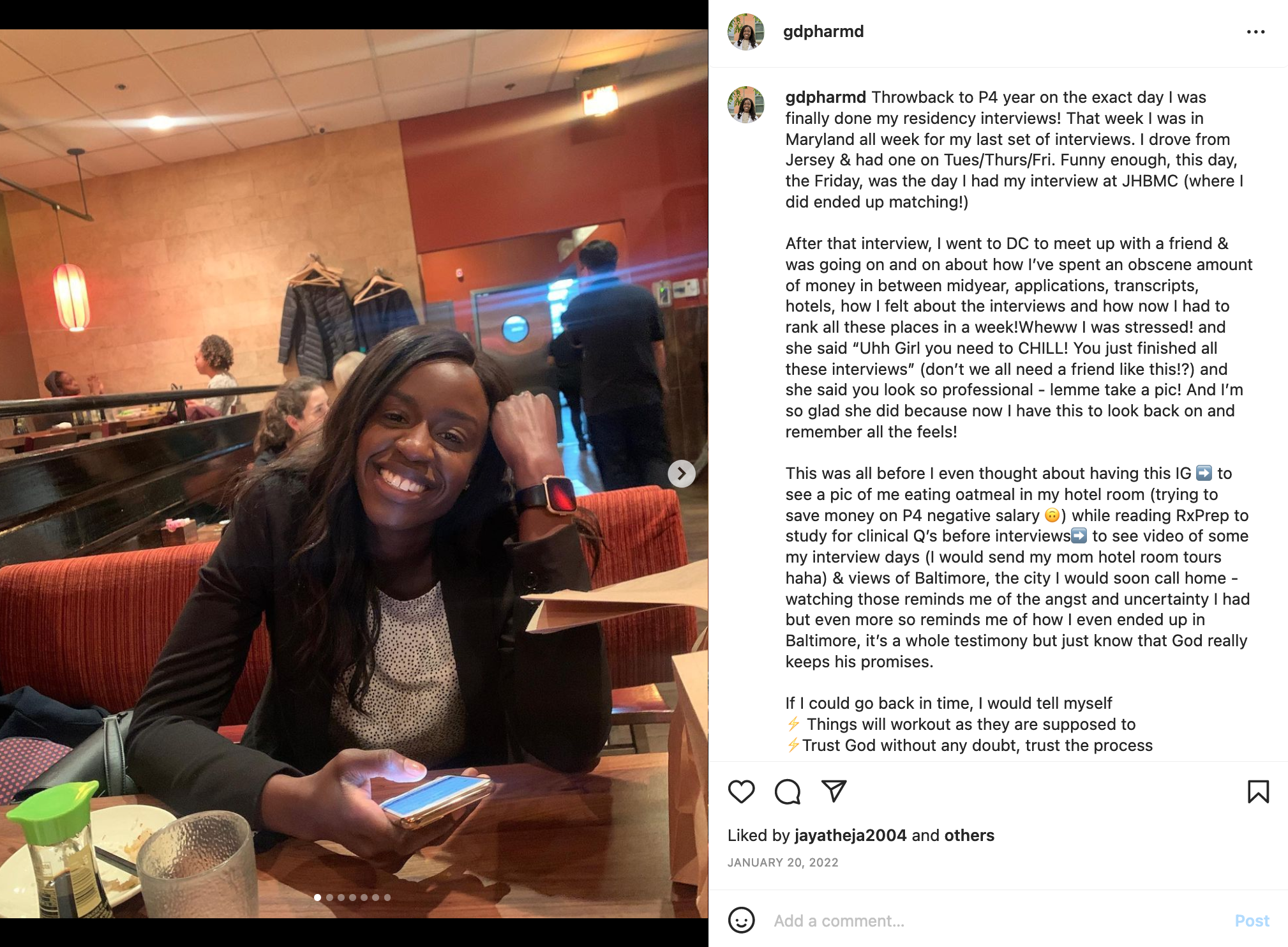
Oh my goodness, interviews! I remember this time as a P4, I was soo stressed!! Handling APPEs, preparing for interviews, and the stress of potentially not matching was a huge weight that I carried from January to March – I felt like I was drowning. I remember being on my APPE rotation and receiving a rejection letter and your girl was distraught! But guess what? I had another interview to prepare for so I had to keep it pushing on what was ahead vs what was left behind. Thank God for closed doors. So if you’re stressed, I know where you’re coming from it IS stressful, so I hope this blog post helps somewhat.
If you’re new to my page, here’s a little about me: I graduated from Rutgers Pharmacy School in 2020 and for residency, I matched at Johns Hopkins Bayview Medical Center (which was my #1 choice since the beginning of the residency process) by the grace of God! I finished up residency in 2021 and then went on to become a Clinical Pharmacist.
I took the questions you guys asked me on my Instagram along with other tips I learned and categorized them into the questions below! So if you want to find out more about Pharmacy Residency Interviews, keep reading! I’m going to try and keep it short and sweet (because I can go on and on about this haha!)
I’ve also created a Pharmacy Residency Interview Tip Guide that can be downloaded here !
FIRST and FOREMOST: When the program sends you an email, read it and then read it again. Know what will be required of you and when and how you need to prepare for it. Is it a presentation? What’s the maximum time requirement? Do you email it to them by a certain date? Do you have to hand in a SOAP note a week before? Do you need to have an updated CV prepared? Read the email carefully!
There are also good resources out there from ASHP, so check them out: ASHP Resources especially their “Student Residency Guide” (make sure you’re logged into your profile to access them).
What can I expect on a PGY-1 Pharmacy Residency Interview?
Each program is very different in how they conduct interviews, so while there is no standard, here are some of my experiences:
Meeting the program directors, preceptors, residents, HR, other pharmacy staff, and other candidates. Doing a presentation. Answering behavioral style questions and clinical questions. Doing drug information questions. Doing some sort of teamwork/group game with the candidates. A laid-back meet and greet with the current residents and a break for lunch.
What kind of questions do they ask?
How to prepare for behavioral questions?
Behavioral questions typically start with ‘Tell me about a time when…’ For example, “Tell me about a time when you worked in a group and someone didn’t pull their weight”
LISTEN! DO NOT and I mean DO NOT fluff up your stories. For example, when you’re asked about a significant intervention you made on rotations, keep in mind those interviewing you have had students and residents for years maybe even decades and they know the level of a student for clinical interventions. Also, emphasize WHY that intervention was important to you! Use the STAR method (photo below) and at the end wrap it up with your why. For example, at the end, you would wrap up with something to the effect of ‘This was significant to me because oncology has always been a weak area of mine so to see how I progressed in knowledge and confidence by the end of the rotation enough to speak up and make an intervention was significant’ depending on what your (S)situation was in the STAR method.
Using the S.T.AR. method ensures that you prepare the scene and end the answer with a reflection. If it’s a negative question/scenario, try to end the answer on a positive note, for example: “and in the end, I was able to learn from that situation and now when given projects I make sure expectations are discussed ahead of time.” Please never leave off the R in the STAR method, this gives interviewers a chance to know what happened and to hear your reflection.
PRO-TIP: Don’t assume everyone in your interview has read your CV in detail. When you answer your questions, incorporate those amazing things you did on your CV into your answers!
A brief example: ” Tell me about a time when you worked in a group and someone didn’t pull their weight”
S: As chair of XYZ organization, I had three committee members that I led and I was largely responsible for planning health fairs in the community and training pharmacy students on how to counsel patients
T: For one of the health fairs, we had to make a presentation on hypertension. The work was divided up evenly and assigned. When it came close to the due date one of the members did not start their section and the other committee members began to be worried/frustrated
A: I spoke with that individual 1:1 and asked them if they were having difficulty with the project, turns out they were new to the pharmacy program and had a hard time adjusting. I connected them with resources and talked through their section of the PowerPoint again and showed them how I did mine
R: Although, the individual finished their section 1-2 days later. In the end, the individual was able to complete their part of the presentation. In the end, I learned that it’s important to always find out the WHY of someone’s actions because maybe they need more assistance or guidance. Looking back, I should have checked in with the team frequently so we could see our progress and I could have noticed earlier the progress of each person.
I hope that example makes sense! You use the beginning (S & T) to set the scene and “plug/market” yourself and explain the situation and your role. At the end (A & R), tell the interviewer what happened, what you learned, and what you could have done differently (this may not apply to all questions). Make sure your answers aren’t long-winded or exaggerated. Tell the truth, always.
How did I prepare for questions?
PRO-TIP: You may get asked the same question by different people, feel free to use a different scenario, you don’t have to use the same one.

I am so nervous about the clinical questions, how do I prepare?
Guess what!? In my interviews, I got a clinical question wrong and it was not the end of the world! With that being said, preparing for clinical questions was stressful because the questions can come from anywhere! Keep in mind not all programs ask clinical questions. If they do it can come in many ways, they can give you a patient case and you have to present the patient to them and you figure out treatment or drug interactions or only identify 1st line therapy or even just explain the disease state. There are classic disease states that every APPE student will likely have been exposed to such as Pneumonia, UTI, COPD/Asthma, Heart Failure, and Diabetes so I would brush up on those.
I tried to know at least 1st line therapy for those disease states or review the algorithms. Did I search all the guidelines? Nope. I legit used my RX Prep book to go over certain disease states since I already had the book and prayed for the best (truly).
If you are interviewing for a residency that’s inpatient, don’t just know a stable heart failure treatment plan. A patient doesn’t get admitted to the hospital if they are stable, they’re admitted because they have ADHF or a COPD exacerbation – how do you treat that? If the patient has diabetes and HF and is overweight, which antihyperglycemic med would be best? What factors does warfarin inhibit? Drugs that cover MRSA? What about Pseudomonas? What are the must-have medications in GDTM for heart failure? etc etc.
What do I do if I don’t know the answer to a question?
Breathe, think, and explain the thought process you have. If you don’t know it, be honest and say something to the effect of “I’m not as familiar as I should be with the answer to that but I will get back to you” (and MAKE SURE you get back to them via email post-interview). Do not let this fumble your entire interview! You aren’t expected to know everything but you can explain your line of reasoning and follow up after the interview ~24-48 hours after (with your thank you email that I talk about below). Even as a resident, I still needed to follow up on questions so don’t be so hard on yourself.
What kind of presentations do you do?
Pharmacy residency interview presentations can be intimidating especially since there’s a wide range of possibilities. The presentation piece is pretty important, so practice and take it seriously! It can be clinical in nature such as a pharmacotherapy/disease state topic or a case presentation or it may be something a little more fun and laid back. Each program will be different, just ensure you fulfill the requirements they ask of you.
Presentation tips
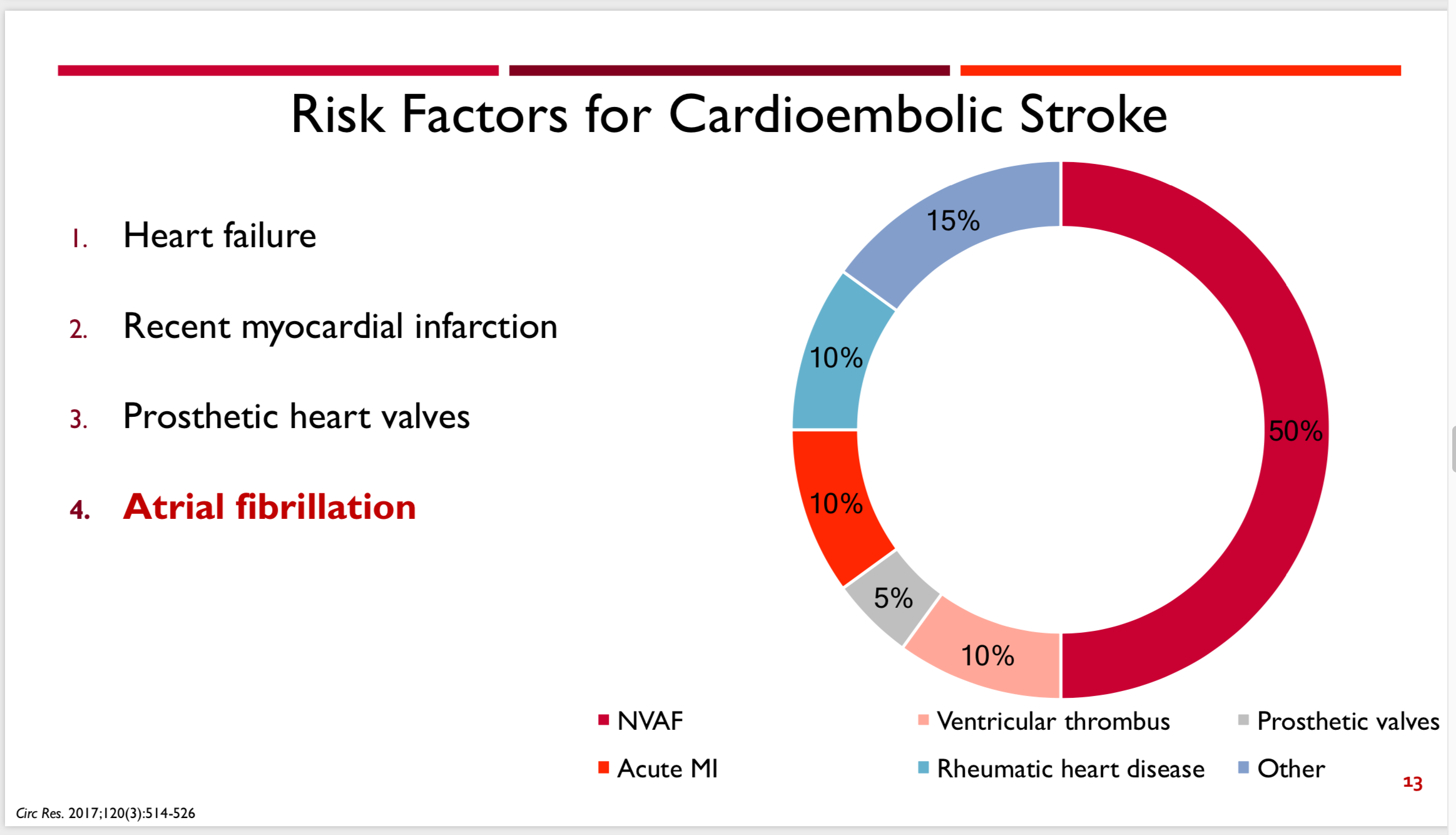
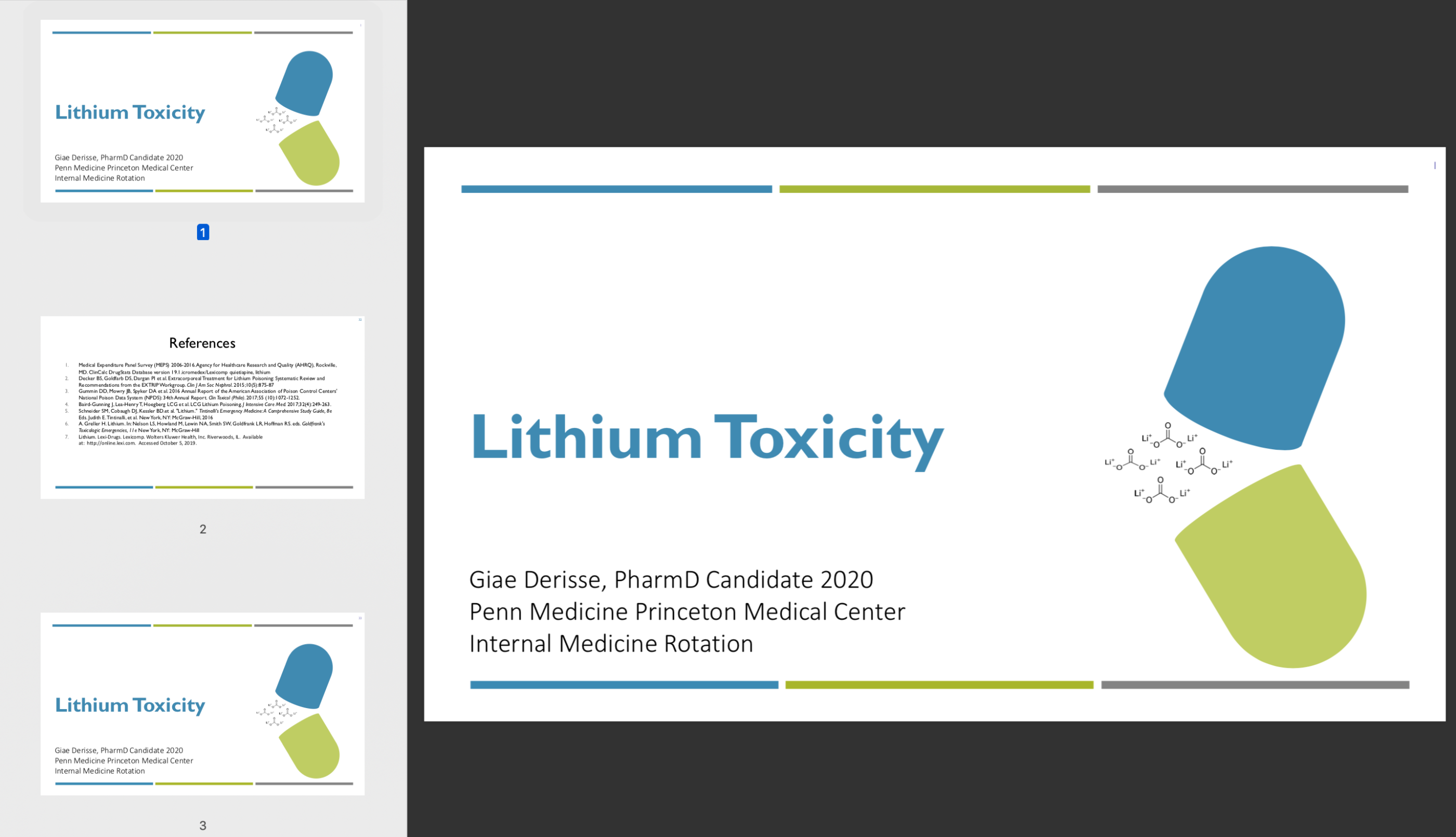
I feel like I asked all the questions I needed during midyear and info sessions – what more can I ask?
This is your time to hone in on specifics. Here are some examples below.

How did you study for the NAPLEX/MPJE and do interview stuff?
I didn’t LOL! I didn’t start studying until about a week after match day. From my last interview to match day I chilled, had fun, and focused on APPEs! About a week before match day (because I couldn’t focus on anything else and was driving myself crazy lol) I made my NAPLEX/MPJE study plan/calendar to help distract myself. Some schools make students study for the NAPLEX throughout APPE year, however, my program did not, so I can’t necessarily give tips about that scenario.
What do I do after the interview?
You NEED to send some sort of thank you.
I know there’s debate about handwritten vs email. Emails suffice in my personal and humble opinion. I typed all of my emails out in a Word document before putting them into an email to send out. I also scheduled the emails (Gmail has a feature where you can schedule the email to be sent at a certain time and date) and aimed between 8 a.m.-12 p.m. on a weekday.
Examples of the emails I sent out!
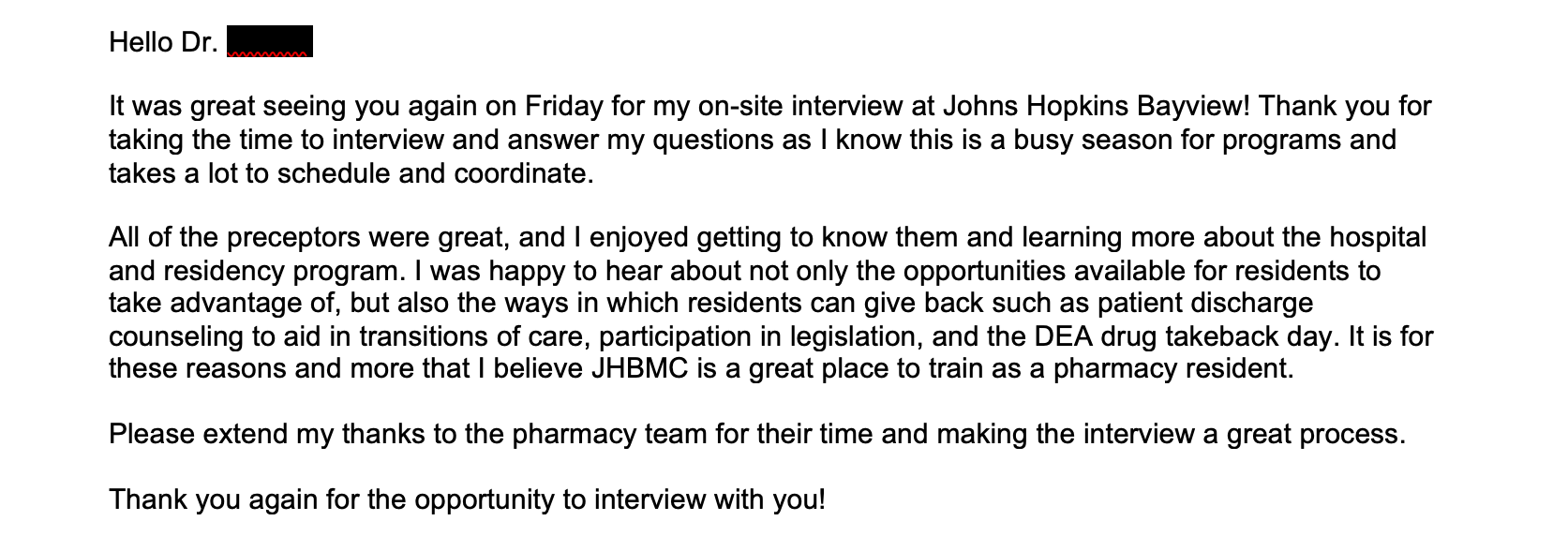
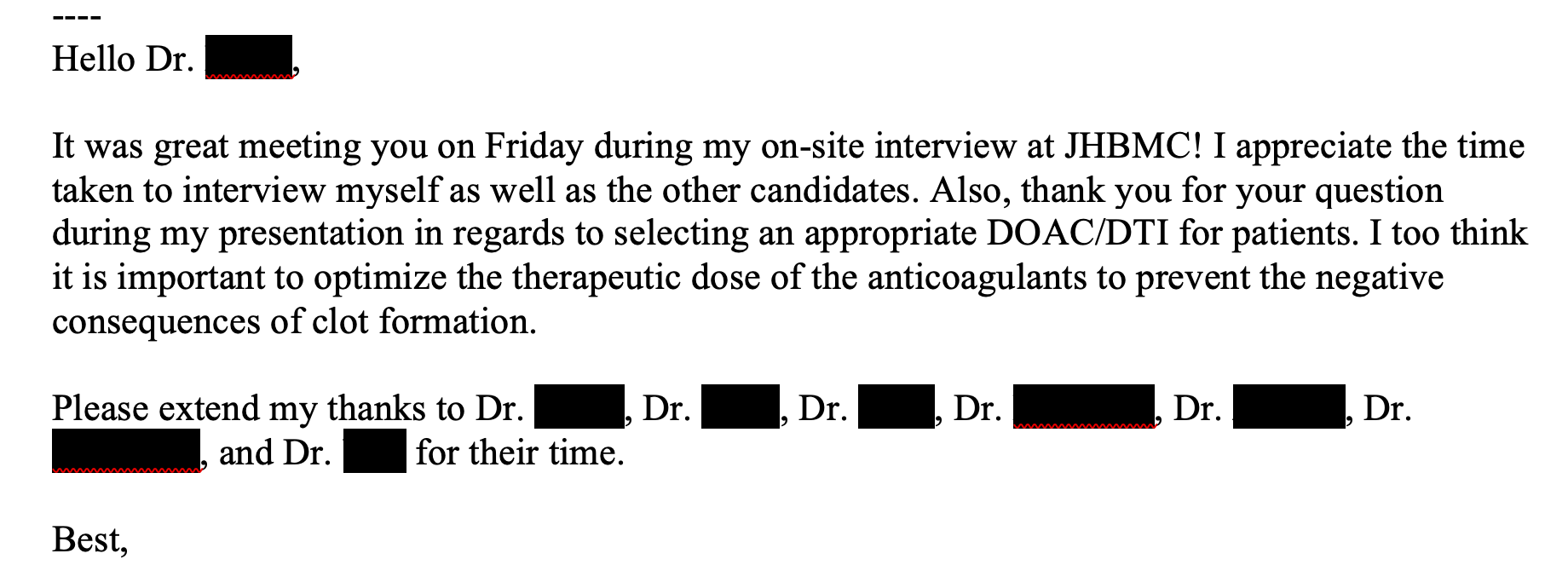
Lastly, REFLECT! Do not wait until the next day. Right after, in your car (or wherever lol) detail how it went and be objective about what you liked and didn’t like and why. It will make it easier when it comes to making your match list. Write down every question you were asked (you may get asked again on another interview!), note down how you feel, the vibes, and also what you think you can improve on for your next interview! You can even record your thoughts and reflections with voice notes or your phone’s camera. Feelings can be misleading though and can depend on many things, so be sure to also have objective truths.
Random Tips
5. Maintain professionalism at all times, you will be a representative of the hospital
6. If your social media is public, make it private or clean up/archive some of your posts if you think they could be perceived in a negative way (even down to WHO you follow on social media). If you don’t want to make your page private or you want a second pair of eyes on your social profile, ask an adult, parent, mentor…etc what posts they may think could be perceived not well — remember the people interviewing you are not necessarily in your generation!
7. LISTEN to the question being asked and answer the question being asked. Don’t ramble.
8. Don’t lie or fluff up your story – be honest, have integrity through and through
9. Don’t talk negatively about others or even other professions
10. Get a good night’s sleep!
11. If you’re doing a virtual interview, make sure your lighting is on point! Remove distractors in the background (like inappropriate posters). Test your tech. Be aware of your facial expressions. Be kind to other candidates and be engaged throughout the process. Fortunately, many meeting software platforms such as Zoom and Microsoft Teams have Virtual Backgrounds or a Blur feature which can help your background not be distracting to the interviewers.
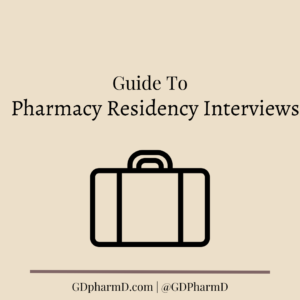
I wish you ALL the best! For more Residency content, check out the rest of my residency blog posts on here and on Instagram. I have created guides and have an Instagram highlight called ‘Rx Resi Help.’
‘Now all glory to God, who is able, through his mighty power at work within us, to accomplish infinitely more than we might ask or think.’ Ephesians 3:20